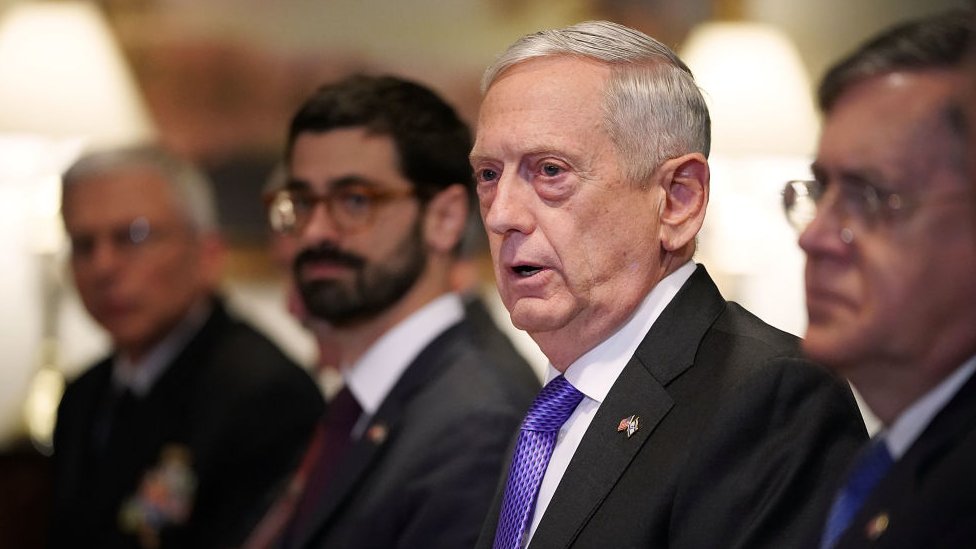
 Image copyright Getty Images
Image copyright Getty Images US senators are asking cabinet secretaries about the campaign against extremist groups in Niger and other places – and whether a new law authorising the use of military force should be written.
Secretary of State Rex Tillerson and Defence Secretary Jim Mattis are speaking on Monday about the president authority to wage war – the first time this has been debated publicly.
The hearing, convened by the foreign relations committee, will shine a spotlight on Mr Trump’s efforts to combat extremist organisations in Niger.
To add to the tension, the committee is chaired by Bob Corker, a Republican from Tennessee who’s been engaged in an intense social-media war with the president.
Under scrutiny is the 2001 authorisation to use military force (AUMF), which was passed shortly after the 11 September 2001 al-Qaeda attacks.
Here are some key questions:
Why is the AUMF so important – and controversial?
The president relies on this law to conduct life-or-death operations.
As commander-in-chief, the president can send troops to battle. Yet the US Constitution says that only Congress can declare war for an extended time.
White House officials found a workaround in the days after the al-Qaeda attacks, however. Lawmakers approved a resolution that gave President George W Bush authority to track down and destroy al-Qaeda and the Taliban.
Members of congress approved a second resolution in 2002, allowing Bush to wage war against Iraq.
In recent years, the authorisation began to seem limited. “It said: ‘Destroy al-Qaeda,'” says Jens David Ohlin, a Cornell Law School professor.
“Well, that’s not really applicable.”
President Barack Obama maintained that the laws gave him the authority that he needed for the campaign against the Islamic State (IS) group, an organisation that didn’t exist when the laws were written.
Mr Trump has continued to carry out an aggressive campaign against the militants, whether in Niger or other countries.
Obama and Trump, says Ohlin, have both “shoehorned” their military efforts into the antiquated authorisations.
Most people pay little attention to the president’s authorisations or the military campaigns themselves, though, until something happens.
In October three staff sergeants, Bryan Black, Jeremiah Johnson and Dustin Wright, as well as Sgt La David Johnson, were killed in Niger.
“All of a sudden people are saying: ‘What are we doing there?'” says Carnegie Mellon’s Melanie Marlowe, a scholar who writes about presidential power.
Even senators were taken aback. “I didn’t know there was a thousand troops [in Niger],” said Lindsey Graham, a Republican from South Carolina, on NBC’s Meet the Press.
The US troops were training local forces in West Africa so they could fight extremist groups in a more efficient manner.
The senators and ordinary US citizens wanted to know why these men were fighting and dying in remote parts of Africa and how their efforts helped to promote the interests of the US.
On Monday senators will discuss these questions with Tillerson and Mattis – and will also examine the president’s authority to send US soldiers into villages in Niger and other countries around the world.
Is a new AUMF necessary?
Many people think so.
In September Republican Senator Rand Paul tried to repeal the current authorisations. He said the laws allowed the president to engage in war “anywhere, anytime, any place on the globe”.
Most senators agree – in theory – that these resolutions should be modernised. They believe that a new law would help the president and ordinary citizens clarify their goals as a nation and determine what they hope to achieve through military action.
Administration officials have said they’d support a new law.
Mattis told members of congress earlier this year that a new law would help to create a united front against extremist groups. “It’d be a statement of the American people’s resolve,” he said.
But the senators disagree about what the new law should look like.
Some want the law to impose a time limit for military operations as well as list the countries where they’d take place. Others think the law should clarify that the military campaign will be limited in scope, conducted without ground troops.
What are the prospects for a new AUMF?
The current authorisations are rife with problems, but they’ve remained in place.
It seems unlikely that a new law will be written – at least not soon.
Creating a new one means that the president, lawmakers and people across the country would all have to agree on how the US should wage war.
It’s a broad mandate – one that senators and cabinet secretaries will debate on Monday.
Follow @Tara_Mc
Note: This story is auto-generated from BBC syndicated feed and has not been edited by AFRICA PRIME NEWS